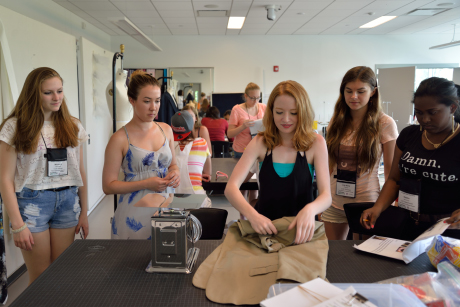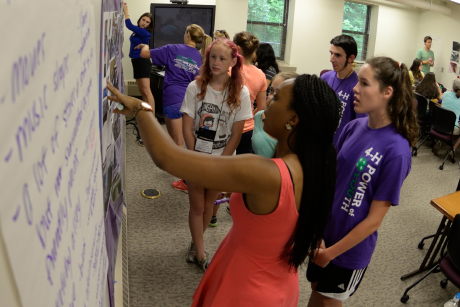4-H youth sample careers, college life at conference
By Sara Birmingham


More than 375 high school students from 45 New York counties experimented with DNA extraction, fashion design, robotics, 3-D printing and a range of other fields at Cornell Cooperative Extension’s annual 4-H Career Explorations conference July 1-3 on campus. The summer tradition, dating back more than 90 years, allows youth to sample college life by working alongside Cornell researchers, living in residence halls and exploring campus and the nearby community.
“It is the personal experiences – meeting faculty members and graduate students, and seeing work in a real-life context – that helps youth realize that it could be them in those roles,” said Nancy Schaff, conference lead organizer and 4-H state STEM program specialist in the Bronfenbrenner Center for Translational Research (BCTR) in the College of Human Ecology.
Sustainability met style in the “Fashion Chop Shop,” a two-day workshop run by fiber science and apparel design assistant professor Tasha Lewis, Ph.D. ’09. Students learned about and applied the practice of “upcycling” by taking used men’s blazers and repurposing them into new apparel. “We weighed our blazers, and after we’re done with the project whoever has the least amount of scraps left wins,” said Kimberly Cabrera, an 11th-grade student from Orange County, who was working in the Human Ecology Building design studio on a dress with a sweetheart neckline and open back.
“We wanted students to be able to understand that you can take something that’s less valuable and make it more valuable,” said Lewis. “We want to help inspire them and help them execute it and keep the momentum going. Sometimes I forget they’re not college students; they’re working really hard.”
Other 4-H participants judged Ithaca’s appeal to college students as part of Youth Voice Through Photos, a program organized by BCTR staff. After exploring and photographing different elements of downtown Ithaca – such as murals, construction projects and bike racks – the teens analyzed their portfolios, exploring such topics as accessibility and safety.
“The youth are talking about what these photos represent and recognizing themes from the data,” said BCTR extension associate Mary Maley, M.S. ’06. “The idea is for them to see that research can be done in a lot of ways.”
Youth participated on two tracks: University U, a program designed to introduce 8th- and 9th-graders to college life, and Focus for Teens, which is aimed at exposing 10-12th-graders to specific career fields.
Early in the program, University U students heard about different paths available in college and beyond at a panel discussion featuring a former Career Explorations participant, Quinn Kolar ’15, a College of Agriculture and Life Sciences student. “Five years ago I came here and met a group of friends, and we’re actually roommates now,” she said.
CCE offered more than 30 hands-on educational workshops throughout the event, partnering with faculty members and graduate students from Human Ecology, CALS, Arts and Sciences, Veterinary Medicine, Engineering and Computing and Information Sciences.
“They go away inspired, engaged and full of excitement about the future and possibilities for education and careers,” said Schaff. “Many of the youth who attend this conference will be our next generation of leaders, innovators, scientists, engineers and policymakers.”
Sara Birmingham ’15 is a student communications assistant for the College of Human Ecology.
Media Contact
Get Cornell news delivered right to your inbox.
Subscribe